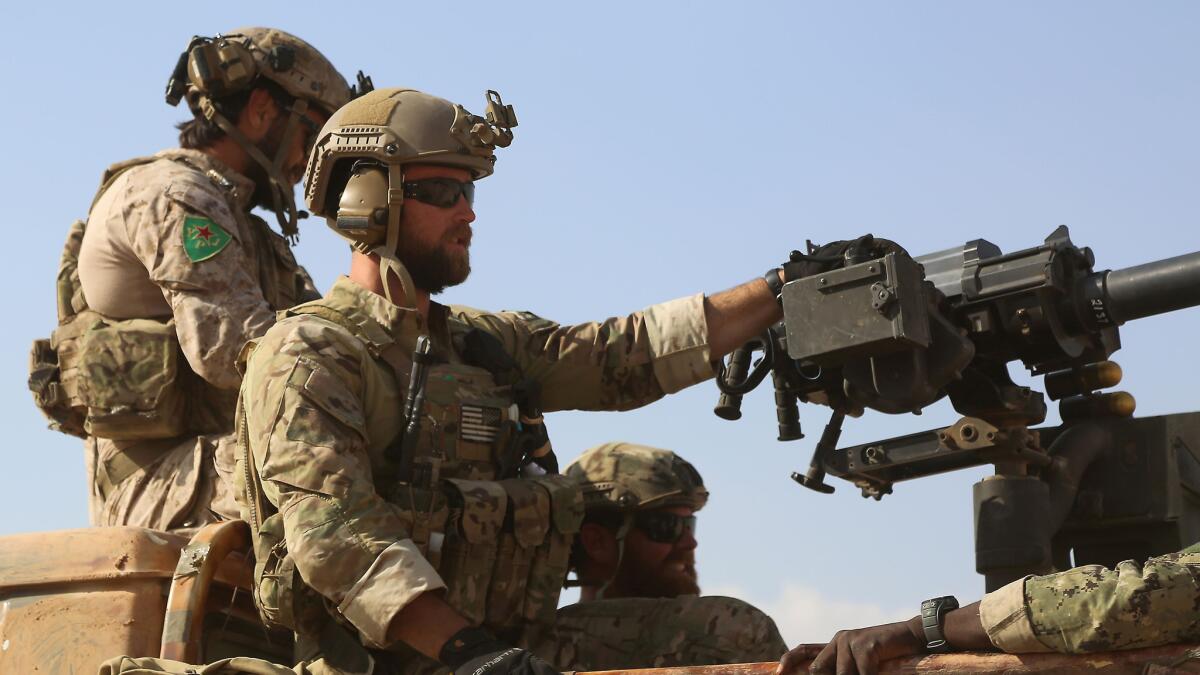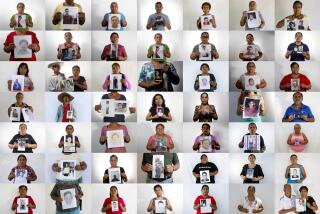Turkish premier says it’s ‘unacceptable’ for U.S. troops to wear Kurdish insignia

Turkey issued a stern rebuke Friday after images emerged of U.S. ground forces wearing the insignia of a Syrian Kurdish militia during operations against Islamic State.
Turkish Foreign Minister Mevlut Cavusoglu said it was “unacceptable” that U.S. special forces would be wearing shoulder patches of the People’s Protection Units, a Kurdish group known as the YPG.
The photos, which were snapped by a photographer with news service AFP, depict what appear to be fully-equipped U.S. Special Forces operators atop a pickup truck. The images, according to Turkish state news operator Anadolu, were taken near the village of Fatisah, some 16 miles north of the de facto capital of Islamic State in Syria.
See more of our top stories on Facebook >>
The soldiers are seen alongside members of the Syrian Democratic Forces, a joint Kurdish-Arab alliance fighting the Islamic State that is dominated YPG. They have the YPG emblem on their arm patch.
A U.S. military spokesman agreed Friday that it was inappropriate for American service members to wear the insignia of a Kurdish force fighting in northern Syria.
Col. Steve Warren, spokesman for Operation Inherent Resolve, which oversees warfare in Syria, said in a briefing from Iraq that he had seen photographs of two U.S. soldiers wearing the patches.
“I think the first thing to make clear is that wearing those YPG patches was -- was unauthorized and it was inappropriate, and corrective action has been taken,” Warren said, “and we have communicated as much to our military partners and our military allies in the region.”
He acknowledged that while army regulations say local insignias should not be used, the “special forces community has a long and proud history of wearing such patches when they are partnering with forces around the world.” He cited Afghanistan, Iraq and Latin America as examples of areas where the special operators train and conduct joint activities.
“This is something that they often do, and it’s an effort to, you know, just kind of connect with those that they’re training.”
Given Turkey’s sensitivities about the U.S. reliance on Kurdish forces in the battle against Islamic State in Syria, the personnel were told to remove the patches. Warren said he knew of no additional reprimand or other disciplinary action.
Turkey maintains the YPG is no different from the Kurdistan Workers Party (PKK), which Ankara and Washington regard as a terrorist organization.
At the State Department on Friday, spokesman Mark Toner reiterated the U.S. position that the YPG and PKK were “separate entities,” although he acknowledged the two groups might have “connections.”
“We believe the YPG, as well as other forces in Syria, northern Syria, are effectively taking the fight to [Islamic State],” Toner said. “And we’re going to continue to support them with our advise-and-assist operations there.”
Last month, President Obama announced a ramp-up of U.S. special forces operators in Syria, even while insisting the troops were only there in an advise-and-assist capacity.
The YPG, which has been touted as the most effective fighting group against Islamic State in Syria, has been the main recipient of U.S. support in the form of airstrikes, training and arms.
ALSO
Nations with poor human rights records block U.N. status for press-rights group
Islamic State claims responsibility for bombings in Syria that killed at least 78
New Taliban leader is seen as more a teacher than a fighter, but don’t expect attacks to end
Special correspondent Bulos reported from Jordan and Wilkinson from Washington.
More to Read
Start your day right
Sign up for Essential California for news, features and recommendations from the L.A. Times and beyond in your inbox six days a week.
You may occasionally receive promotional content from the Los Angeles Times.








